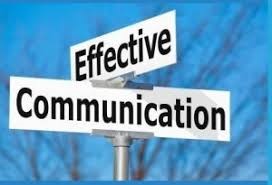HAVE YOU HEARD ME RIGHT?
Dr.S.Subaramanian
Wonderful years of top class schooling and an amazing time at an internationally acclaimed college of medicine have helped me chisel out a structured communication strategy. Years of working as a paediatrician has made me confident of applying this strategy to the best use.
I know what it takes to help someone make informed decisions. I also know how to take things in stride when someone makes a decision that may not, according to me, the best choice. Many a times I convince myself saying “I gave all the needed information. Have done my job”. I then get on with my next job.
Looking back at those situations I wonder if my inner self was really satisfied with such a consolation. Answers is the obvious NO. Those discussion with the parents were often played back in continuous loop in my mind. My mind used to be preoccupied with those discussions. Those endless efforts to provide information in the right perspective. That gulpy moment where you feel your best was not enough. Had a couple such back to back moments over the past 48 hrs that I needed to sit back and analyse those moments.
Apart from the traditional factors, some new factors have been added to the communication process. The influx of information access. The media – mainstream and social media have often projected a very grim picture of medical field sowing quite a few seeds of doubts in the doctor- patient relationship. I see quite a few of my colleagues upset and extrapolate the views of few to the whole society. Add to this the entry of corporates in a big way into medical field. Management executives have entered the medical field (many with knowledge and background in medical field and most with no clue about what they are doing). The traditional role of a doctor/ physician as the captain has been challenged. Now you see the mixed bag that we have in our hands.
Under this backdrop, I went back to my roots. Went back to my study table to sit back and analyse. This is what I figured out:
Communication with parents mostly focuses on explaining the risk benefit ratio of a medical procedure.
Do I take a vaccine or not? Do I go ahead and do a CT or not? Do we put the child on a medicine or not? These are some day to day questions which I often answer.
So how do I answer these questions better?
Let me summarise my (re)learnings.
- Good medical practice encompasses effective communication about benefits and risks of health interventions.
- There is a substantial gap between patient expectations and current practices for providing information regarding patient procedures or options.
- Individuals often have a variety of personal in experience and values affecting their risk perception. Social factors, belief systems, previous health care experiences, values and the individual’s unique worldview can all in influence their risk perception.
- It is of the utmost importance that the benefits and risks of the intended procedure are communicated to the parents and the child in a way that they are able to understand, taking into account their unique cultural and social attitudes.
Experts perceive
Risk = hazard X exposure X susceptibility
Parents/ patients / public perceive
Risk = hazard + [fear, anger, outrage]
There lies the essential difference of opinion. Thus, the essence of risk communication is not just explaining risk numbers but also managing the potential outrage (i.e. reducing or increasing it).
There is a need to ensure that all referring medical practitioners have sufficient background, education and resources to communicate clearly and effectively about the benefit ts and risks of paediatric procedures.
Effective communication with patients and caregivers is increasingly recognised as critical to patient-centred care, and a vital component of effective health-care delivery.
So now I have my road map. Let me now find ways to make it work.


